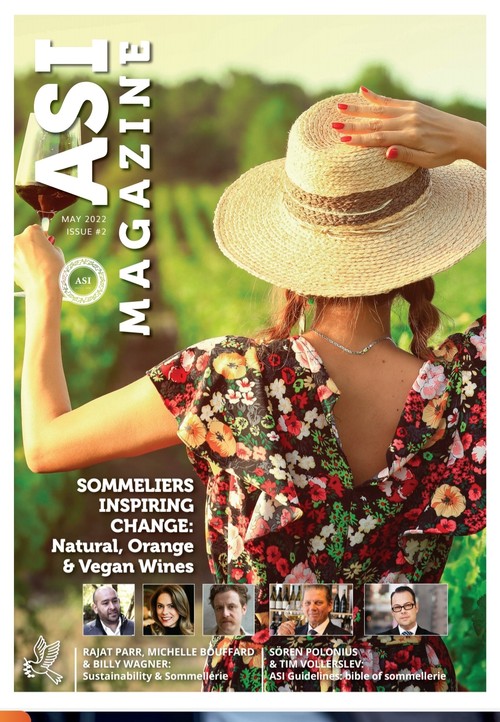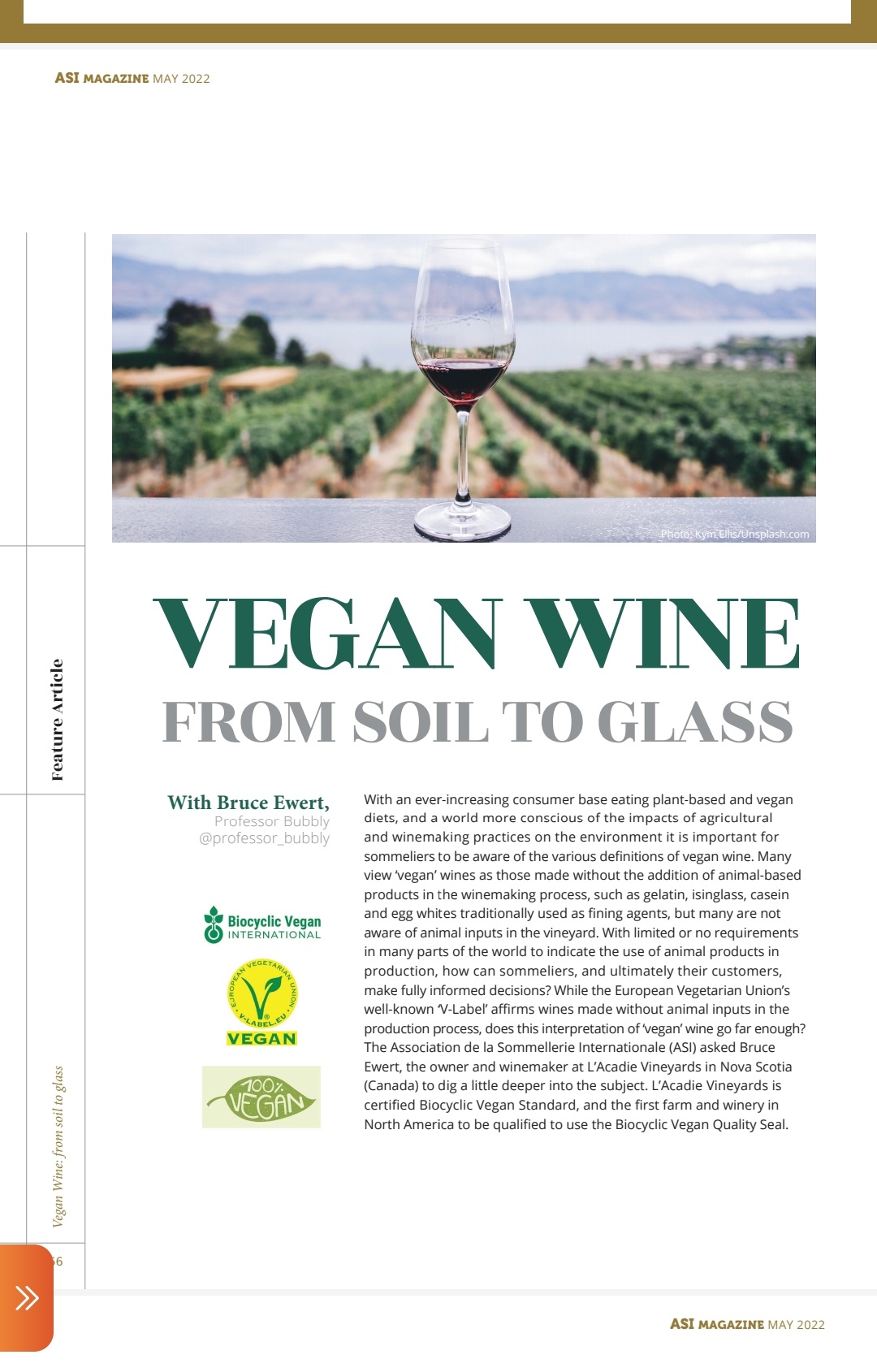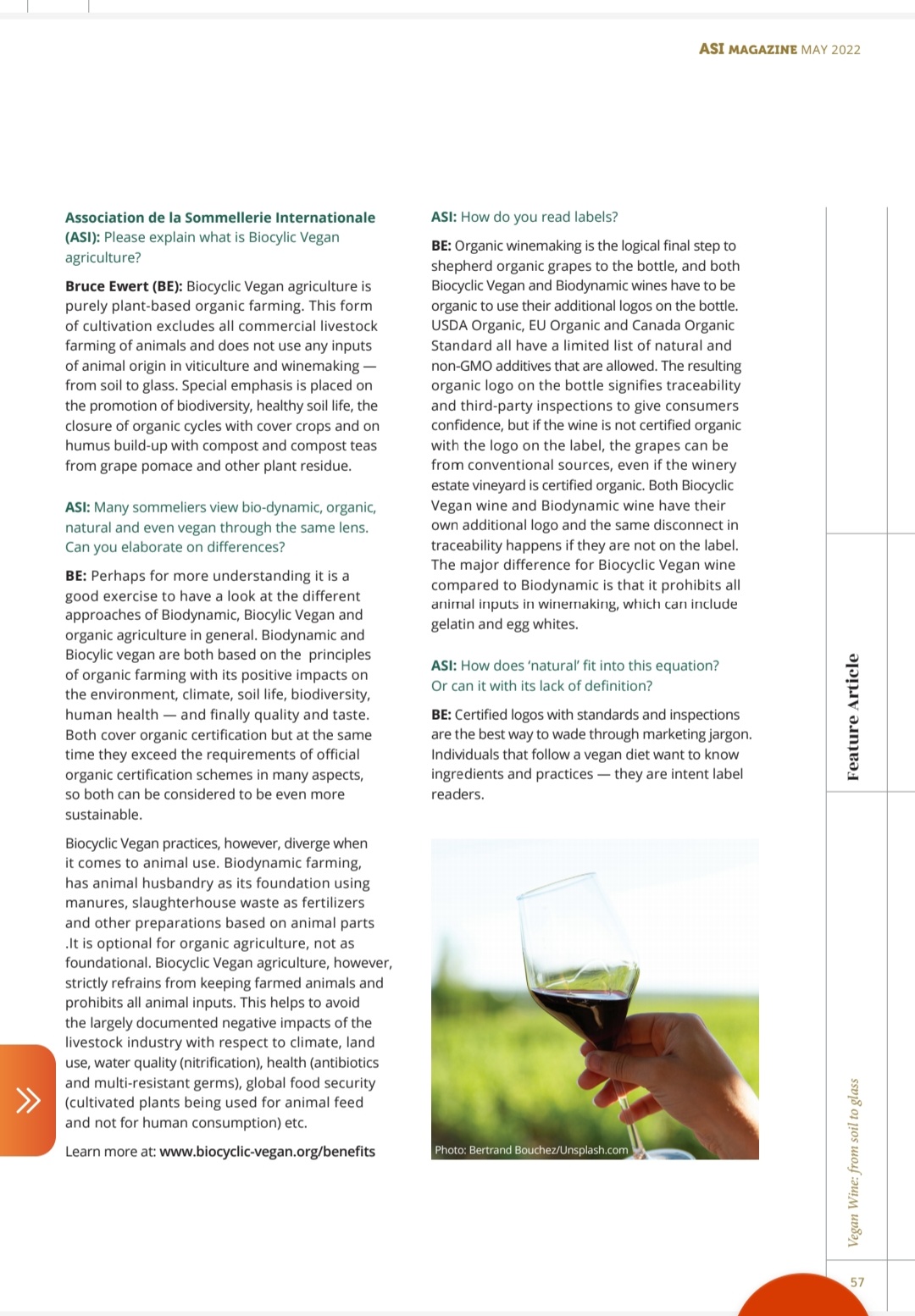L'Acadie Vineyards Blog
Welcome to the L'Acadie Vineyards blog and winery news
Biodynamic and Biocyclic Vegan - what's the difference?
Both names start with “bio” and there are other similarities, but Biodynamic and Biocyclic Vegan practices diverge when it comes to animal use.
Our winery in Gaspereau, Nova Scotia is organic, grape growing and winemaking, and recently also certified Biocyclic Vegan from soil to glass. Our reasons for following these standards are that organic vegan wine is good for the planet, animals and people. Most people are familiar with Organic farming but may not have heard of Biocyclic Vegan or Biodynamic farming. Let’s compare all three.
Pesticides
There are many pesticides allowed for grapes, surface and internal acting. Grapes are listed as one of the dirty dozen, a list of heavily sprayed fruits and vegetables published by the Environmental Working Group. Hybrid grapes are fairly disease-resistant but more and more disease-susceptible vinifera grapevines are planted in Nova Scotia every year. Organic production follows the Canadian Organic Standard, the practice of producing food without synthetic pesticides, herbicides or genetically modified organisms (GMO), and certified organic is required to be able to certify your winery to Biodynamic or Biocyclic Vegan Standards.
Living Soil and Fertilizer
All three practices promote healthy microbial life in the soil. The concept is that the farmer manages the soil so that it can provide for the vine, rather than the conventional approach of feeding the vine directly with synthetic fertilizers. Biocyclic Vegan and Biodynamic farming both rely on enriching cover crops between the rows to hold carbon (regenerative agriculture) and to transfer atmospheric nitrogen to the soil. Compost teas, either plant residue or animal manure-based, are used to grow beneficial organisms to increase and stimulate life in the soil and on the vine. This is the first diverging practice - Biocyclic Vegan prohibits anything from animals so only plant residue teas are allowed such as composted grape pomace and there is a reliance on cyclical humus management with composted plant material. A second difference is the spiritual approach of Biodynamic - planting by calendar and using preparations such as burying cow horns filled with manure.
Biodiversity
All three practices promote harmony with nature. They support ecological protection and animal welfare, and the Biocyclic Vegan approach goes further by excluding all animals, both working animals and inputs from them, recognizing that there are deep ethical considerations. Biodiversity practices that follow this ethos strive for a higher level of harmony than Organic. Biodynamic has animal use required and takes into account the rhythms of nature with a more spiritual approach.
Both Biocyclic Vegan and Biodynamic have human development at their core, nuturing the social and economic development of people.
Winemaking
Organic winemaking is the logical final step to shepherd a wine to the bottle. The Canada Organic Standard has a limited list of natural and non-GMO additives that are allowed and the resulting organic logo on the bottle signifies traceability and third party inspections to give consumers confidence. If the wine is not certified organic with the logo on the label, the grapes can be from conventional sources, even if the winery estate vineyard is certified organic. Both Biocyclic Vegan wine and Biodynamic wine have their own additional logo and the same disconnect in traceability happens if they are not on the label. The major difference for the Biocyclic Vegan Standard is that it prohibits all animal inputs in winemaking, which can include gelatin and egg whites.



Environmental
This is where the divide widens considerably in Biocyclic Vegan’s favour. By prohibiting all animal inputs, it is not supporting the well documented global warming impact of the livestock industry. Biodynamic farming has animal use as its foundation with manures and preparations using animal organs, but has non-intensive and lower yielding requirements to lessen its environmental impact.
A final note. Our reasons for choosing the Biocyclic Vegan approach from "soil to glass" are rooted in a love for all living beings. As we grow our winery and inspire others, it is important to be informed and know that we all can make a difference.
"When you know better, you do better" ~ Maya Angelou

Why we are Biocyclic Vegan
Last year, we achieved certification to the strict Biocyclic Vegan Standard based in Europe, the first farm and winery in North America. This vegan wine certification is a significant addition to our environmental stewardship, scaffolding the benefits of our certified organic status to new heights. Coupled with health benefits and animal welfare, you can see why it is so popular in Europe.
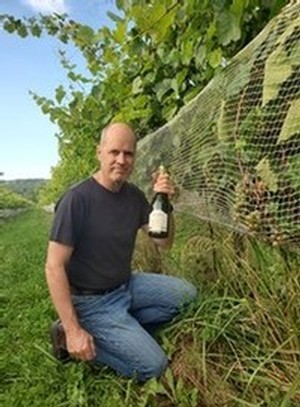
We had been looking for a certification for our vegan wines and were so happy when we found Biocyclic Vegan based out of Germany and Greece. We discovered that they certify the whole operation including the vineyard as well, and ours scored very high because of organic practices, biodiversity and not using animal inputs since 2017. The estate vineyard has been organic since inception, the first in Nova Scotia, and we released organic wines in 2008. Compelling reasons are better terroir flavours from living soils, healthy wines avoiding pesticide residues and, more significantly, protecting the environment from pesticides and synthetic petroleum-based fertilizers, both high carbon-generating practices. Biocyclic vegan practices raise the bar even more.

Biocyclic vegan agriculture means purely plant-based organic farming. This form of cultivation excludes all commercial livestock farming of animals and does not use any inputs of animal origin in viticulture or winemaking. Special emphasis is placed on promotion of biodiversity, healthy soil life, closure of organic cycles and on systematic humus build-up. Vegan viticulture enhances our environmental stewardship by avoiding products from the high carbon-generating livestock industry and instead using constant cover crops (also called green manure) between rows for regenerative agriculture carbon management. Composted grape pomace - stems, seeds and skins from every vintage, is significant for further sustainable management of our soil’s nutrition and microbial life.
Biocyclic Vegan certification recognizes our extra sustainable efforts and care that are beyond organic, veganic, and we embrace their principles for the good of environment, animals and people.
A Note from our Summer Intern
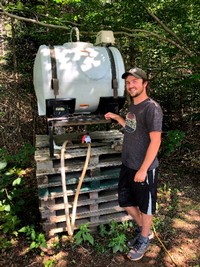
Hello, my name is Matt and I am the Clean Leadership summer intern at L’Acadie Vineyards. Throughout the summer I have learned a lot about growing and maintaining our certified organic Gaspereau vineyard, and how to preserve its natural ecology - which fits well into my recent degree in Biology from Dalhousie University.
One of the many projects I have been working on is the production of grape pomace nutrient tea. The purpose of this tea is to extract the beneficial microorganisms and micronutrients from composted grape skins (pomace) that are composted after each harvest, as well as from forest soils behind the vineyard. After steeping and aerating the mixture, we apply it to our vineyard to help crowd out potentially harmful microorganisms and pathogens with the beneficial ones in the tea. This all-natural, vegan and organic nutrient boost helps to preserve natural ecology of our vineyard including living soils and emphasizes terroir flavours in our grapes.
It has been an amazing 15 weeks here at L’Acadie Vineyards and I am very grateful that I was given the opportunity to work here this summer. I look forward to what the future brings to the Wolfville vineyard and what new and exciting projects will be implemented.
Is Wine Vegan?
Is wine vegan? Yes, all L'Acadie Vineyards wines are vegan and organic, and we also follow vegan viticulture. So what can makes other wines not vegan? We all know that wine is grown in the vineyard, that practices and weather can play a significant role in ultimate wine quality. So let's start there.
Vineyard management varies depending on varieties, vineyard location and philosophy. Our location is deeply rooted in Gaspereau, Nova Scotia and we grow several varieties - L'Acadie blanc, Leon Millot, Chardonnay, Sauvignon Blanc and Pinot Noir. Click here for more about our terroir. The latter varieties are in the vinifera family and are more sensitive to disease so require more attention. Strategies include hilling the trunks in winter, leaf removal next to clusters and shoot positioning for air circulation, periodic sulfur applications on the leaves and plant residue teas. That brings us to philosophy, which really has two camps - conventional and organic. We have been organic since first planting our estate in 2005/2006 and our nutrient management includes beet extracts for a nitrogen source rather than animal manure. Synthetic inputs are not allowed in organic systems and these include petroleum-based fertilizers, glyphosate weed killer, and a host of systemic and contact pesticides that ultimately make it into your wine.
Winemaking is the more direct source for non-vegan inputs. The most prevalent is gelatin, derived from animal slaughtering. It is a protein fining agent that is routinely added to hard press juices to reduce the bitter tannins that were squeezed from the skins. And there are other proteins used to similarly reduce bitterness and astringency in wines - egg whites for barrel aged reds, casein (cow milk) for correcting oxidized wine, and isinglass from fish bladders. So what do we use? Bentonite is a clay that has amazing clarification and stabilization benefits, and a riddling aid to help the yeast slide down the bottle for traditional method sparkling. For tannin management, we only make reds when the season gives us ripe tannins and phenolics(don't bother looking for 2018 and 2019 vintages), and after careful maceration techniques and aging in barrels we don't need to reduce astringency.
Organic winemaking is low intervention. And as Heather Rankin at Obladee Wine bar in Halifax said it once, "You have to know a lot to do a little". So very little inputs and essentially nudging the wine along its evolution path to become what it was meant to be in the vineyard, a wine with soul and transparency. Organic certifiers audit our grape sources and all our inputs, and the Canada Organic logo on our bottles is your assurance.
Join our organic wine clubs! Click here for more information
Terroir and Organics
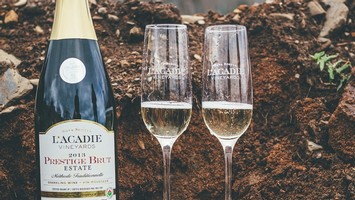
The grapevines that grow at L’Acadie Vineyards would tell you that they’ve had to work hard to get where they are today and that they are extremely proud of the flavours that they extract from the warm, dry, rocky, sometimes inhospitable conditions that they grew up in. Now in their 15th year their roots reach over a metre deep and the deeper they go the more minerals, flavours and water they can access that give our Estate wines their unique character. Helping them along the way is a complex ecosystem of fungi, worms and bacteria that our organic practices have been carefully managing and nurturing. It is this link between terroir and organics that the best wines of the world are based on.
We chose our site for the rocks back in 2004. I had been making traditional method sparkling in Okanagan for years, and before that in Ontario, California and Australia, and we were looking for a site to produce the first sparkling wine for Nova Scotia. And we wanted to do it organically after my head was turned, and my path changed, at Summerhill Pyramid winery in Kelowna, an organic winery. As head winemaker, I saw better flavours from grapes farmed organically, after many years working with conventional grapes. Our Nova Scotia vineyard search started in the 90’s on working vacations returning to Pauline’s home province of nine generations. The Annapolis Valley was the focus with it’s climate moderated by the Bay of Fundy, and the Gaspereau Valley sub-appellation was intriguing for both it’s proximity to the bay, and shelter with the Wolfville ridge. The mantra at the time was “south slope, south slope…” but we found a ribbon of ancient seabed with good drainage along the base of the south mountain, facing north-west, that was calling to us. The south-facing other side of the valley had clay loam, typical for Nova Scotia, but I thought a better soil for sparkling was rocky and well drained, making it warmer in the spring and mineral rich from the fractured schist and sandstone deposits - all sedimentary rocks in their origins. Another plus was that the property had been fallow for decades, used for grazing horses, and we could skip the usual three year transition to be organic.
Plants weren’t always on land. Their origins are in the sea being bathed in nutrients constantly, a nice gig. When they made their hardy evolutionary step to land they had to form an alliance with soil organisms to survive, a symbiosis, and in exchange for a small amount of nutritious sap, the organisms living around their roots help them breakdown and make all sorts of nutrients and minerals available to the vines. Root zone influence increases to 2-10 times with this network of mycorrhizal fungi, accessing more nutrients and more flavours. But these microbes are delicate and the rise of pesticide-focused agriculture in the 1950’s reduced their populations significantly. The result is dead soil where the plants have to be fed non-organic usually petroleum-based fertilizers directly… an old adage in organic farming, “with organics you feed the soil, in conventional farming you feed the plant” But with this conventional approach the vines are also less able to extract flavour from the soil, resulting in wines with less terroir flavours, less sense of place, less soul.

We have farmed our site organically from inception, largely to promote a living soil for better terroir flavours. We planted with cuttings propagated in an organic mixture of peat moss, alfalfa and lime, and to decrease weed competition, used a dead mulch of wood shavings and later a living mulch of clover under the vines. Composts teas are brewed in our 300 litre brew tank with composted pomace from the winery, managed with aeration to encourage a fungal-dominant compost. An organic inspector once told me that they were convinced that compost tea and kelp foliars are all a plant needs to thrive in a living soil, by both stimulating growth and encouraging a healthy soil. Foliar teas also help disease control by crowding out opportunistic disease organisms on the leaves and clusters with beneficial organisms. Our recent participation in a three year provincial Terroir Study helped us understand more about our soil- prompting us to renew our cover crop by cultivating and seeding clover. Benefits are aeration and nutrient release and we are further investigating new cover crops to match our terroir. Studies with several universities are qualifying the types of organisms present in our soil, on our leaves and clusters, and in our wild ferments.
There are transitions to organics happening around the wine world, recently from British Columbia’s gigantic Mission Hill and their growing list of winery holdings, and large French wineries such as Roederer. A quote from their winemaker about the iconic, and expensive, champagne Cristal, ” At that price, I just don’t feel comfortable not being organic.”
The organic practices at L’Acadie Vineyards encourage the terroir signature of our estate – minerality and slight saline flavours from schist and sandstone, and I am confident that future generations of our family will be producing estate wines such as Prestige Brut Estate and Estate L'Acadie with those flavours for years to come.
Traceability and Organic Wine
Do you know where the wine in your glass was grown? A winery can choose to use an appellation designation to give you validated information, and of course there is the required country of origin on the label, or wineries can simply share unverified vineyard sources on back labels. Much like appellation systems control a region’s wines, the Canadian Organic Standard controls organic wines and can be trusted to ensure the organic grape content in the bottle through rigorous inspections.
The Canada Organic symbol on a bottle of organic wine is controlled by the Canadian Food Inspection Agency and is the only validation to consumers of organic grapes, organic wine production and no GMO products – all inspected by a certifying body. The traceability audit is one of the many facets of an organic winery’s operations that are scrutinized on an annual basis. Record keeping has to be exemplary for the inspector to trace wines back to specific parcels of vineyards, and to ensure proper chain of custody and non-contamination. And each grower that supplies grapes must be organic themselves, providing a vital record for the wine audit. This traceability is one of the major foundations behind the organic symbol on the bottle.
Scrutiny in food production has steadily increased for food safety, sustainable efforts and consumer demand. The pandemic has intensified that consumer demand, with authenticity and local origin catapulting to the main stage. Traceability is becoming more important to wine drinkers to ensure authenticity and avoid counterfeit wines, a problem associated with high end prestige wines that is now creeping into lower price points. Solutions such as Blockchain, a transparent and secure record system that is most famous for Bitcoin transactions, are starting to be applied to build trust between wineries and consumers. Is the future QR codes on bottles that trace the wine right to the grape source? Perhaps, but right now consumers can trust a symbol that is transparent, validated and authentic and that is the Canada Organic symbol.
What is Clean Wine Anyways?
Social media is humming with the release of a self-declared “clean wine” from celebrity Cameron Diaz and her partner. The issue in the wine world is that if her wine is “clean” then what does that make all other wines? She exposes 70 ingredients that her wine doesn’t have – a vegan, organic rose and white wine grown in Spain and made in France.
First of all, thanks to Cameron Diaz for initiating conversation about organic wines and I want to share the story behind our clean wine. It’s not just marketing buzz, it’s about passion and knowledge to follow a difficult path of commitment, transparency and traceability that is certified by government-led inspections. I’ve been at this a long time, first making organic wine as a BC winemaker and now for my own winery in NS, the first in the province. We promote our wines simply for what they are – certified organic symbol on the label along with other geeky transparent information such as dosage amounts, and that they are appropriate for vegan diets. We also talk about reasons why we farm and make wine that way – environment, terroir flavours, health. So maybe we should change this marketing direction? Instead of just talking about the natural inputs used in organic production, maybe what we don’t use? Such as, no glyphosates aka the weed killer Roundup. And no systemic pesticides that protect the vine from within. The residual ends up in your wine, and contact pesticides can leave residual as well, even if you wash grapes prior to pressing, which is not common practice. And talk about the animal aspects of growing and making wine. Not only do we not use animal inputs in our wine but also none in our vineyards – vegan agriculture.
We also don’t talk about all the ingredients and practices that can go into making conventional wines: gelatin, gum arabic, sorbic acid and other preservatives, colour, tannins, nutrients to name a few are all added to wines around us. We have been following our clean wine path for a long time and our enlightened fans understand the hard work that goes into making quality organic wine. So thank you Cameron Diaz for initiating the dialogue.

